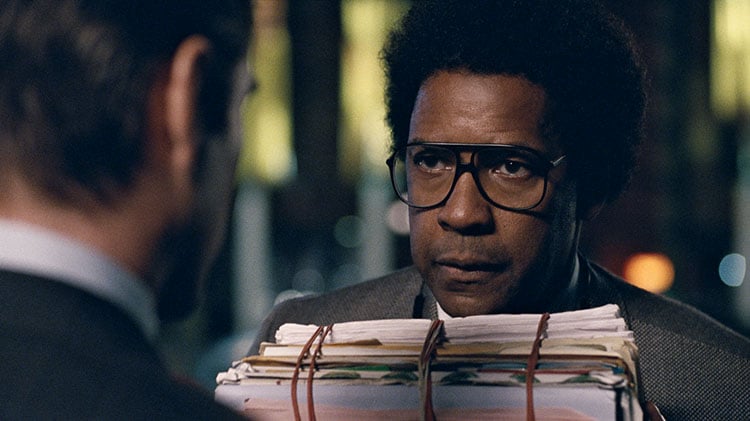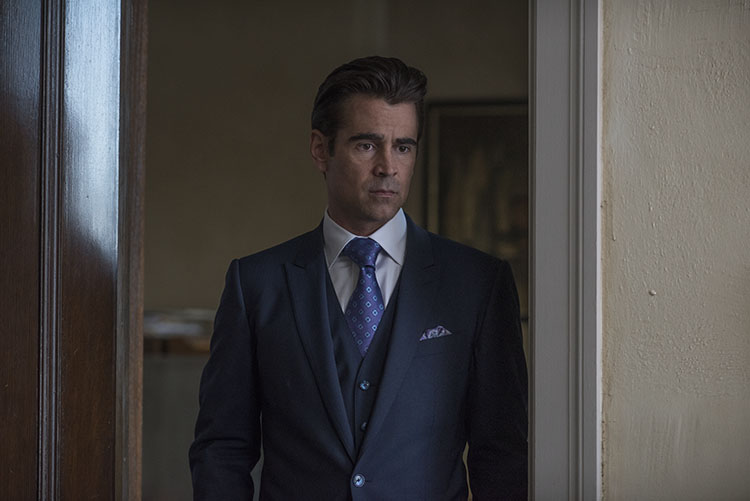Denzel and lawyer hell: 'Roman J. Israel, Esq.' and the attorney afterlife

Denzel Washington in the title role of “Roman J. Israel, Esq.” Photos copyright © 2017 CTMG, Inc.
Let’s face it. Every attorney in private practice knows the drill. You work your entire career with a goal in mind. For some, it’s the greater good: justice, social reform, personal rights … all the “good” things. For others, it’s more personal: money, comfort, security … all the “selfish” pleasures that make life a little easier.
Some lawyers actually achieve their goal. Some even achieve it through the lifelong practice of law. However, the sad reality is that many attorneys never actualize their aspiration. For whatever reason, there are plenty of practitioners who simply stall out. Before they know it, life takes the reins. Maybe family becomes a bigger priority. Maybe they wasted their prime.
Many attorneys leave the practice of law without reaching their goal … that reason they became lawyers.
CHASING THE GOAL
In the film Roman J. Israel, Esq. (I told you I’d watch it eventually), Denzel Washington portrays the film’s namesake. I rented it on Amazon Video, and it’s worth a watch. Though Denzel didn’t take home the hardware, he still delivers an Oscar-nominated performance.
(If you haven’t seen the movie yet, reader beware. Here come some spoilers.)
The eponymous attorney is an aging civil rights and criminal defense lawyer whose practice is on the brink of failure. His law partner and breadwinner suffers a massive heart attack, and Denzel is set to handle that day’s docket by covering all of his partner’s in-court appearances. The problem, though, is that Denzel’s character Roman has spent his entire legal career, upwards of approximately three decades, chasing his goal. He set out to reform the system. He ended up as part of an office that “runs more like a charity service than a law firm.” His goal was to expose the dark underbelly of criminal defense: that most defendants are effectively denied their day in court because of coercive “plea bargaining” techniques.
Anyone who has practiced criminal law from the defense perspective knows unequivocally that the cards are stacked in favor of the prosecution. This is illustrated as Roman covers his ailing partner’s docket (with strict instructions for “JUST CONTINUANCES!).
Roman’s role in the office has always been behind the scenes. He is a brilliant brief writer who has a damn near photographic memory (he memorized the entire California Pleading Code). He has chosen to stay out of litigation and let his partner handle the personal appearances for their entire careers, because he “doesn’t have the patience for the butchery” that goes on inside the courtroom.
As he navigates his partner’s docket, he tussles with a young prosecutor who makes a “take-it-or-leave-it today” offer for prison on a first-time offender. Roman wants to discuss mitigating circumstances, and the prosecutor tells him her “conviction rate is 100 percent”—she doesn’t care about mitigation.

Colin Farrell as George Pierce in “Roman J. Israel, Esq.”
THE ATTORNEY AFTERLIFE
After covering all of the cases that day (and getting a $5,000 fine for contempt), Roman is forced out by the partner’s niece who has power of attorney. She brings in another attorney to tie up the business and close out the office, and she makes it abundantly clear that Roman needs to find a new job because he’s “not capable of running the practice.”
During his ouster, he is introduced to the new attorney the niece brought in per the partner’s directive: a younger, “stud” attorney in a helluva three-piece suit. His name is George Pierce (played by Colin Ferrell), and he runs four offices in the glutted criminal defense landscape that is Los Angeles.
George obviously has the presentation aspect of the practice down, and he’s doing something right from the business perspective as well. Still, he admits to Roman that he wants to bring him on. He offers to pay him well, but Roman wants no part of it. To Roman, George is everything he has fought against his entire career. Roman is well versed in George’s MO: “Take a retainer, waive your client’s right to a prelim, then dump them on a public defender when they complain.”
Roman declines the offer, but soon finds—though a montage of unsuccessful attempts at joining a new firm—that times have changed, and perhaps passed him by.
Like so many other practitioners, Roman has found himself on the brink of the “attorney afterlife.”
Those lawyers who make the practice of law a lifetime legacy are few(er) and far(ther) between these days. Perhaps it’s the grind of trying to balance the business of law with the practice of law. Perhaps it’s just the burnout factor. For others, it’s the disillusionment of realizing that no matter how hard they try, they’ll never reach their goal.
LAWYER HELL
If the attorney afterlife is set out in degrees, then Roman has found himself in “lawyer hell”: the final acknowledgement that you didn’t reach your goal, you’re never going to reach your goal, and maybe … just maybe … your goal was never within reach in the first place.
Roman realizes this when he is forced to take a position in one of George’s offices to make ends meet. George sells potentials with his standard pitch, and then tosses them to Roman as the “point person” for the clients. He is a glorified paralegal with restrictions on his ability to negotiate for the clientele.
Roman clashes with the culture of George’s office. He calls it how he sees it, and he sees a bunch of money-hungry attorneys uninterested in the ideals that he has fought for his entire career.
During an argument with George about these situations, Roman mentions a brief he has been working on for the past seven years. It is a class action lawsuit with more than 3,500 former clients. He claims it will completely reform plea bargaining—groundbreaking litigation, sweeping federal challenges. And he wants George to partner with him on it.
George has no interest in the project, though. Remember, he has four offices to run (and fund), and he doesn’t have the time or the interest, to push the project. He tells Roman to either put the brief on the back burner and focus on his role in the office, or go get another job.
Without giving too much of the plot away, Roman decides to stay with George’s firm and compromise his goal. He gives into the culture of the business of law: money becomes his new goal. He betrays a client’s trust for a large payday, he buys new suits and shoes, he moves into a new condo, he starts to eat at nice restaurants, and he starts to fleece potential clients to get them to sign up.
At the same time though, it appears George may be living in his own self-imposed lawyer hell as well.
SEEKING SALVATION
A major theme throughout the movie revolves around the proverbial fork-in-the-road. It’s that one moment when everything in your life can change for better or worse.
The audience is treated to both sides of the coin. Roman has turned his back on his lifelong goal. He becomes disenchanted with the reality of ever making a real change to the system. He quips that he’s “tired of doing the impossible for the ungrateful.” He argues that his original goal was a mistake. “We filed the wrong brief, in the wrong court, to the wrong judge.”
Roman’s historical “good fight” ultimately has an effect on George, though. George decides to appoint Roman the head of his offices’ new pro bono division. He also decides that he wants to make an even greater difference by pushing for the completion of the class action lawsuit brief that Roman has spent so much time on. George starts to see that his legacy isn’t shaping up to be quite what he envisioned in his youth. He has the personal success, but maybe that’s not enough.
Ultimately, both George and Roman see their character arcs cross. Both attorneys realize that having a single, overriding goal is not the legal dream. Whether the goal is for the greater good or personal prosperity, an attorney who has a blind focus on one narrow path will never be completely fulfilled. At the end of the day, an attorney has to make a living—but making a living might not be enough without making a legacy (to one extent or another).
Throughout the movie, both George and Roman struggle with the fear of the (attorney) afterlife, and the audience sees both change, for better or worse, because of it. All in all, the film ultimately focuses on a question probably as old as the practice of law itself. It’s a question that every private attorney, and probably some in the public sector, have asked themselves at one point in their career:
“What happens when the business and practice of law is through with you?”

Adam Banner
Adam R. Banner is the founder and lead attorney at the Oklahoma Legal Group, a criminal defense law firm in Oklahoma City. Mr. Banner’s practice focuses solely on state and federal criminal defense. He represents the accused against allegations of sex crimes, violent crimes, drug crimes, and white collar crimes.
The study of law isn’t for everyone, yet its practice and procedure seems to permeate pop culture at an increasing rate. This column is about the intersection of law and pop culture in an attempt to separate the real from the ridiculous.



